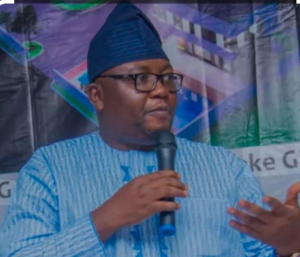Why the Government Continues to Subsidize Electricity, by Minister of Power, Adelabu
Why the Government Continues to Subsidize Electricity, by Minister of Power, Adelabu

Minister of Power, Adebayo Adelabu
Chief Adebayo Adelabu, Minister of Power, clarified yesterday why the government continues to subsidize electricity. He revealed that the average production cost per kilowatt-hour significantly exceeds the average consumer charge, leading to substantial government expenditure on subsidies.
Adelabu explained that it costs approximately N120 to produce one kilowatt-hour of electricity, while consumers are charged as little as N65 per unit. This disparity was discussed during an oversight visit by the House of Representatives Committee on Power to his office in Abuja.
He noted that the cost of electricity production does not include additional expenses incurred by power utilities within the Nigerian Electricity Supply Industry (NESI). “Consumers in Band A pay N209, while those in Band B pay N65. The average cost to produce one kilowatt-hour of electricity is at least N120, not accounting for evacuation, wheeling, and distribution charges. Therefore, those paying N65 or N58 are significantly below the production cost, which is why the federal government is still subsidizing,” Adelabu stated.
Adelabu also mentioned the government’s plan to improve sector infrastructure to move more consumers to Band A. He suggested that tariff adjustments might be necessary to address sector liquidity issues but indicated that a new tariff policy might be proposed in the next six months.
Additionally, Adelabu highlighted a recent milestone: for the first time in three years, the power sector generated, transmitted, and distributed 5,155.99 megawatts of power as of August 8, 2024. He compared this to the 4,000 megawatts achieved when the current administration took office, noting that it took over 35 years to increase capacity from 2,000 to 4,000 megawatts.
On a related note, Engr. Abdulziz Sule, Managing Director of the Transmission Company of Nigeria (TCN), disclosed that the company requires N1.5 trillion to complete 129 capital projects over three years. He cited funding shortfalls, outdated equipment, and infrastructure vandalism as major challenges impacting electricity transmission in Nigeria.
During the House of Representatives Committee’s visit to his office in Abuja, Sule reported significant improvements in grid reliability due to enhanced grid management. He mentioned ongoing efforts, including grid expansion and maintenance, which are expected to bolster grid stability and efficiency. Sule also highlighted the implementation of grid automation and Supervisory Control and Data Acquisition (SCADA) systems, which will enable real-time grid monitoring and control, reduce transmission losses, and enhance fault response.
TRENDING SONGS
 Shock in Anambra: Bride Disappears Moments Before Wedding
Shock in Anambra: Bride Disappears Moments Before Wedding
 Nigerian Woman Returns ₦330 Million Accidentally Credited to Her Account
Nigerian Woman Returns ₦330 Million Accidentally Credited to Her Account
 APC Don Reach Morocco?’ VeryDarkMan Reacts to Seyi Tinubu Poster
APC Don Reach Morocco?’ VeryDarkMan Reacts to Seyi Tinubu Poster
 Bride Breaks Down in Tears as Wedding Meals Were Kept Secretly While Guests Go Home Hungry
Bride Breaks Down in Tears as Wedding Meals Were Kept Secretly While Guests Go Home Hungry
 Odogwu by Day, Robber by Night: How Marriage Joy Turned Into Tragedy
Odogwu by Day, Robber by Night: How Marriage Joy Turned Into Tragedy
 Nigerian Officials Allegedly Pocket N4–6B Weekly Through Smuggling Cartels at Seme–Badagry Border
Nigerian Officials Allegedly Pocket N4–6B Weekly Through Smuggling Cartels at Seme–Badagry Border
 Ahmad Yerima: Naval Officer to Face No Sanctions After Clash with Wike – Matawalle
Ahmad Yerima: Naval Officer to Face No Sanctions After Clash with Wike – Matawalle
 Trending Video: Muslim Man Joins Wife in Hallelujah Challenge ‘Dress Like Your Miracle’ Night
Trending Video: Muslim Man Joins Wife in Hallelujah Challenge ‘Dress Like Your Miracle’ Night
 Woman Seeks Advice as Late Brother’s Wife Refuses to Mourn Him Following His Death With Alleged Mistress
Woman Seeks Advice as Late Brother’s Wife Refuses to Mourn Him Following His Death With Alleged Mistress
 Nobody Cares About Fine Girls In The UK, I Miss Nigeria — Nigerian Lady Laments
Nobody Cares About Fine Girls In The UK, I Miss Nigeria — Nigerian Lady Laments
Share this post with your friends on ![]()













